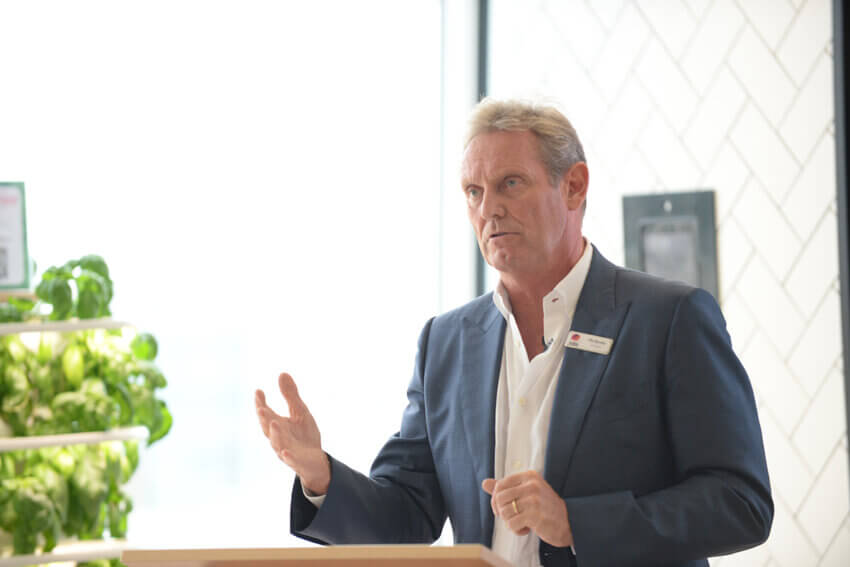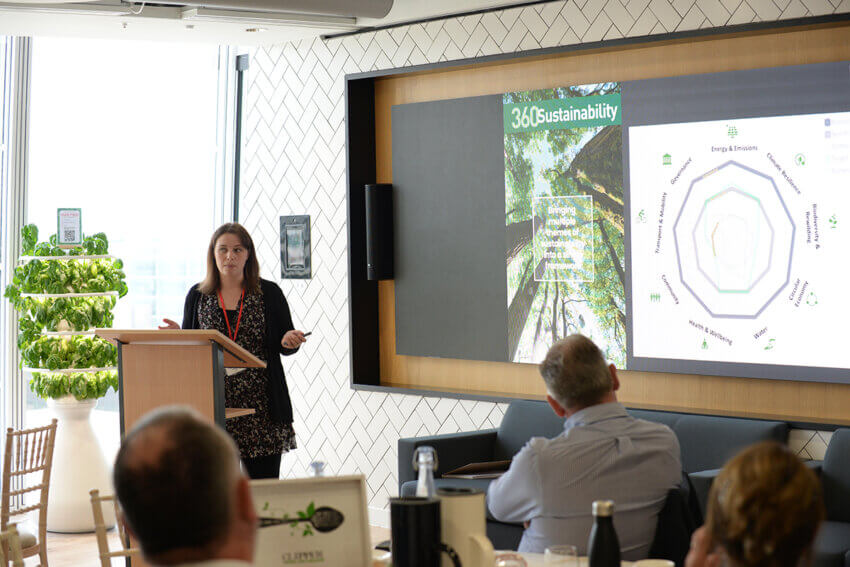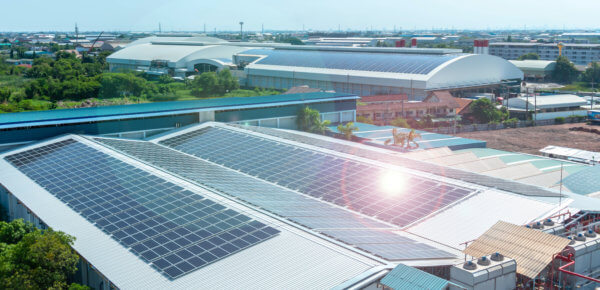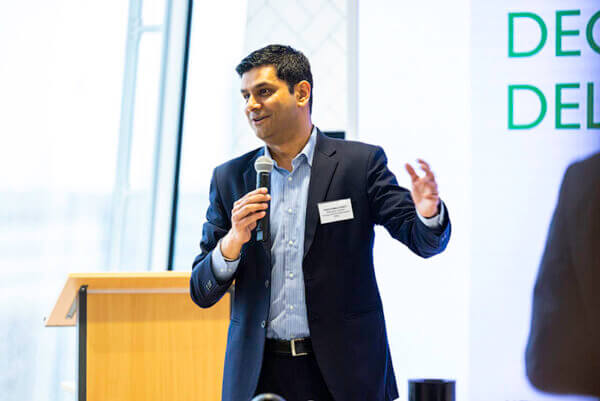Five key insights to unlock estate optimisation
Learn how to propel your organisation closer to net zero.
Urgent action is needed if the UK is to reduce carbon emissions by 45% by 2030, in line with Government commitments.
In his opening remarks, Mitie’s Director of Projects, Mark Caskey, emphasised the importance of a collective approach to decarbonisation.
He said: “Do we have action plans that are going to help us get to net zero? Do we have the investment?… Events like today are for sharing learnings. We can take things back to our businesses and come up with new ideation around improving energy management into the future and continuing on the path to net zero.”
Let’s explore five key briefing insights that will help with the challenge of 2030…
Insight #1: Take tough decisions

During his presentation, Mitie’s Head of Energy Optimisation, Martin Reed, revealed many supermarkets are reluctant to install energy-saving fridge doors.
And the reason? The doors may obstruct shoppers from goods they wish to buy.
The fridge door issue illustrates the tough decisions that must be made across multiple sectors if 2030 targets are to be reached.
During his welcome speech, Mitie’s Chief Executive, Phil Bentley, highlighted that influential organisations are responsible for taking difficult decisions to see that the 2030 goal is met.
He said: “Some 18% of UK carbon emissions come from UK business. Without action from people like yourselves, this will only increase.”
Insight #2: Just get started
Phil went on to share a quote from the energy expert and Managing Partner at EP Group, Dr Steven Fawkes: “Don’t throw all your investment into brand new solutions – start by managing what you’ve already got more effectively.”
The theme of making a start, no matter how insignificant it may seem, featured throughout the event.
Mark Caskey also underlined that while organisations face challenges in terms of energy costs and reducing carbon emissions, the solutions needn’t be complex or expensive.
He said: “Research shows the national grid will see a 50% increase in electricity consumption by 2036, and that will double by 2050. We also know the built environment drives 40% of the world’s carbon emissions…But there is a lot we can do to become way more efficient.”
Insight #3: Proptech is essential
Keynote speaker and renowned proptech influencer, Antony Slumbers, addressed Four great challenges on the road to 2030.
Describing 2030 as a ‘brick wall’, with which the UK will collide if decarbonisation isn’t pursued more effectively, Antony listed four actions organisations must take to avoid disaster:
- Decarbonisation of real estate
- Adapt to the move to hybrid, remote and distributed working
- Repurpose and renovate obsolete buildings
- Provide support to ensure cities thrive despite such change
And the key to success? Proptech.
Antony said: “We’ve got to be more creative, more innovative, more visionary. This is a market for visionary people – the innovators and the creatives. And a market for the technologist. Because none of this is going to be possible without a tonne of technology. Anything to do with technology means it’s absolutely boom time for proptech, which is needed everywhere.”
Insight #4: Bring your people on the journey
Next Emma Johnson, from the Sustainability, Future Workplace, People & Places team at Lloyds Banking Group, shared the bank’s sustainability journey. This included the Connected Branches energy efficiency programme, for which the bank partnered with Mitie.

Emma noted that success depended on a mix of:
- Infrastructure
- Technology
- Behavioural change
Measures implemented by the bank included:
- External LED lighting at head office in Edinburgh, resulting in a 73% energy saving.
- Installing a ground source heat pump at the Halifax branch, which alone was responsible for 10% of the bank’s carbon emissions. The solution has saved over 1100 tonnes of carbon emissions.
- Sustainable refurbishment of the Oxford Street branch in London, which included furniture made from recycled materials, LED lighting and a new building management system to monitor energy.
The Connected Branches programme has contributed to 13% annual savings across electricity and gas at 101 Lloyds branches.
And Emma emphasised the importance of bringing people on the sustainability journey by embedding a carbon-conscious culture.
She said: “We need to help colleagues to commute and travel between offices in a sustainable way. We trialled a project called ‘Lift Share’ in Bristol and recently launched it to the whole group. We’ve had 2,000 colleagues sign up and benefit from lift sharing…We’re also supporting our colleagues to live more sustainably at home. That’s why we’re negotiating offers and discounts to help them in their home lives and across our offices.”
Insight #5: Understand everything… and everyone
A lively Q&A session followed, hosted by Mitie’s Strategic Technology Director, Simi Gandhi-Whitaker.
The contributors were Director of Workplace at Sky, Diana Foxlee, Director EEVS, Hilary Wood, Project Manager: Net Zero & Sustainability at Department for Work and Pensions, Ian Almond, Head of Service Delivery Estates & Facilities Division at University of Sussex, Scott Noble and Senior Sustainability Manager at Lloyds Banking Group, Matteo Deidda.
Throughout the conversation, the importance of first understanding the estate was a recurrent theme. However, it’s also important to know what key stakeholders and decision makers are thinking; everyone needs to be on board to achieve decarbonisation.
Diana Foxlee said: “Understanding is the absolute foundation, plus understanding the decision makers and policy holders… Properly understanding drivers and making it everybody’s responsibility. It needs to feel really motivating for everybody.”
The clock’s ticking
Concluding the event, Mark Caskey, summarised the learnings that will help get Decarbonisation, Delivered.
A combination of tech, people and culture will prove a powerful tool in helping the UK reach its 2030 target.
Mark said: “This brings around technology, data, workplaces, human experience and how we set ourselves up for the future…We really have to make the next seven years count…You’ve got to have the frameworks for gaining buy-in and helping to scale across your estate. All of us talked about technology and data. What you do should take you closer to your customers, make them happy and create working environments that keep them fulfilled for the longer term.”
Interested in our next event?
Would you like to join our next brunch briefing to learn more about getting Decarbonisation, Delivered?
Simply fill in the form and we’ll be in touch with more details soon.
Read next

With decarbonisation, teamwork makes the dream work
Delivering an effective decarbonisation strategy requires coordination across every department. Here’s how to make that happen. As we explored in a recent conversation with Plan Zero Director at Mitie, Mike Sewell, the best net zero strategies…

Build a decarbonisation business case that speaks volumes
Building a credible business case for decarbonisation matters – but how do you articulate it to senior decision makers? Plan Zero Director, Mike Sewell, explains. There’s no way around it – decarbonisation must become…

Four important lessons on the road to decarbonisation
Accelerating decarbonisation plans was the hot topic when representatives from the public and private sectors met with sustainability experts at our breakfast briefing. How can organisations successfully navigate the path to net zero? This…
 Skip to content
Skip to content